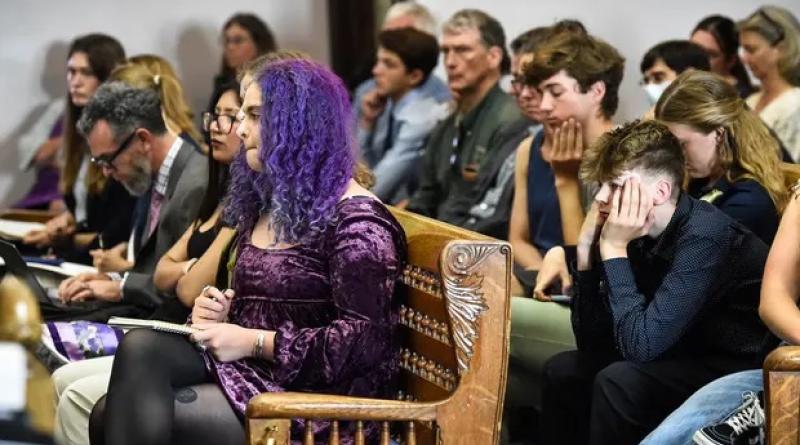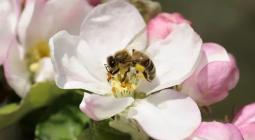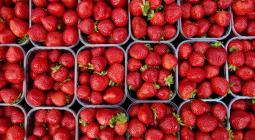Traumatic loss’: Indigenous traditions hit by fruit scarcity, climate trial hears

Every year, Shane Doyle looks forward to picking chokecherries. The tiny fruits with shiny, dark skin and astringent flesh are abundant near his family’s Bozeman, Montana, home. His daughters Ruby, 15, and Lilian, 12, take the lead on crushing the berries into sticky, sweet syrup, which they pour on to pancakes and other foods all year.
Usually, the chokecherries are ready to pick in late summer, just before school begins. But in recent years, the fruits haven’t ripened on that schedule, Doyle testified on behalf of Ruby and Lilian at a seminal climate trial on Wednesday.
Thanks to drought and heat, the fruits’ season has become less predictable, Doyle told the first judicial district court of Montana. One summer, his family didn’t find any at all.
Every year, Shane Doyle looks forward to picking chokecherries. The tiny fruits with shiny, dark skin and astringent flesh are abundant near his family’s Bozeman, Montana, home. His daughters Ruby, 15, and Lilian, 12, take the lead on crushing the berries into sticky, sweet syrup, which they pour on to pancakes and other foods all year.
Usually, the chokecherries are ready to pick in late summer, just before school begins. But in recent years, the fruits haven’t ripened on that schedule, Doyle testified on behalf of Ruby and Lilian at a seminal climate trial on Wednesday.
Thanks to drought and heat, the fruits’ season has become less predictable, Doyle told the first judicial district court of Montana. One summer, his family didn’t find any at all.
“It’s something that people have so closely associated those two things for so long, over 100 years, and now we’re seeing a shift,” he said.
Extreme weather has also taken a major toll on Crow Fair, Doyle said. In several recent years, it’s also been extremely hot and smoky due to wildfires. That can make it much more difficult to engage in the Crow Fair’s many outdoor activities, such as doing traditional Crow dances, which Doyle said “require athleticism” because dancers must “keep time with drum beat which is usually pretty fast”.
Twice in the last decade, the event has also been “washed out” and cancelled by heavy rains. Having to miss a celebration that connects Crow Indians with their heritage, is a “traumatic loss” for Lilian and Ruby, he said.
Ruby, 15, has asthma, said Doyle. Asthma and respiratory conditions can be hugely exacerbated by exposure to heat and wildfire smoke, physician Lori Byron, an expert witness for the plaintiffs, testified earlier in the day.
But the stress and anxiety associated with experiencing climate-related weather events can also take a serious psychological toll, especially on children, whose brains and bodies are more vulnerable than adults,’ said Byron. This can lead to cascading health effects.
Another expert witness invited by the plaintiffs, Michael Durglo, testified later on Wednesday. Durglo, the department head of the Confederated Salish and Kootenai Tribes’ tribal historic department, has spent years studying the effects of climate change on Indigenous peoples, and has helped tribes develop climate adaptation plans.
For people who rely on natural ecosystems for food and medicine, he said, the climate crisis poses a physical threat.
For many, he said, witnessing dramatic changes in “the nonhuman relatives that we rely on” – like plants and animals – also takes a spiritual toll.
Sariel Sandoval, a 20-year-old member of the Salish tribe and another plaintiff in the case, also testified on Wednesday. She is now a student at the University of California Berkeley, but she often feels homesick for her home in the Flathead Indian Reservation in the north-west corner of Montana
When she graduates, she plans to move back home to pass down her cultural traditions, like digging for bear root, a root found near her home that her tribe uses as a medicine for cough, cold and stomachache. Many of these practices depend upon a stable climate.
“It’s been something that’s been very much ingrained in me,” she said of the cultural practice. “It makes us who we are.”
cover photo:Plaintiffs listen to testimony during a hearing in the climate change lawsuit, Held v Montana, on Tuesday in Helena, Montana. Photograph: Thom Bridge/AP





